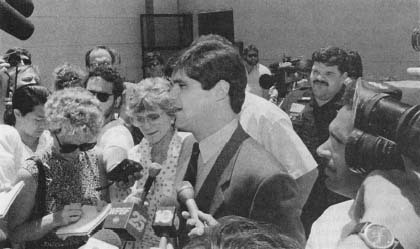William Kennedy Smith Trial: 1991
Tabloid Interview Nets $40,000
In a blistering cross-examination, defense counsel Roy Black knocked gaping holes in Mercer's testimony. He forced a retreat from her earlier assertion to police that Bowman had been raped twice, and that on one of these occasions Smith's uncle, Senator Edward M. Kennedy of Massachusetts, had watched. Black also got Mercer to admit that she had failed to inform the authorities of details she subsequently revealed for the tabloid TV program "A Current Affair."
Gasps filled the courtroom when Mercer confessed that she had been paid $40,000 for her story. By implication, Black suggested that Mercer's tale had been heavily embellished for monetary gain. It was a stigma that the witness never fully shrugged off. Black drove home his advantage by playing Mercer a taped account she had made earlier for the police that contained several statements that disagreed with the version she had provided the court.
 After posting a $10,000 bond, William Kennedy Smith makes a statement to the press.
After posting a $10,000 bond, William Kennedy Smith makes a statement to the press.
In a surprise move, prosecutor Lasch produced the accuser early in the trial. To protect her identity, TV cameras obscured Bowman's face with a blue dot. (Following the trial Bowman elected to abandon her anonymity for a TV interview.) Referring to the defendant first as "Mr. Smith," and later as "that man," Bowman described the alleged assault, saying, "I thought he was going to kill me."
When Black chided Bowman for several lapses of memory, she insisted, "The only thing I can remember about that week is Mr. Smith raped me."
Black wasn't impressed. "I know you've been prepared to say that."
Bowman snapped back. "I have not been prepared to say anything."
Throughout his cross-examination Black walked a fine line; how best to undermine the accuser's credibility without wishing to appear bullying or insensitive. On those occasions when his questioning provoked a tearful response, Black immediately backed off and suggested a recess. Under his deft probing, however, Bowman did acknowledge a history of problems with men, resulting, she said, from "having one-night stands."
On rebuttal, Lasch asked Bowman whether she had any ulterior motives for bringing the charge. Bowman replied, "What he did to me was wrong. I have a child and it's not right and I don't want to live the rest of my life in fear of that man. And I don't want to be responsible for him doing it to someone else."
This final comment brought Black to his feet, objecting. Judge Lupo ordered the remark stricken from the record, calling it "inappropriate."
Curiously, the prosecution called Smith's uncle, Senator Edward Kennedy, as its witness. If, as some observers believed, Lasch was attempting to visit some of the senator's perceived foibles upon his nephew, then she sorely miscalculated. For some 40 minutes Senator Kennedy managed to re-create Camelot in a Palm Beach courthouse as he evoked memories of the family's numerous tragedies. Nothing he said was remotely helpful to Lasch's case. Not for the first time the prosecution's strategy showed signs of being ill-conceived and poorly executed.
Much of the defense was built around forensic testimony. Charles M. Sieger, an architect, said that, given the house's construction, had Bowman screamed as she claimed, the sounds would have been clearly audible indoors, yet no resident admitted to hearing anything.
Rather less successful was Professor Jay Siegel's testimony. He stated that sand found in Bowman's underwear most likely came from the beach, which tallied with Smith's version of events, and not the lawn, where Bowman claimed she had been raped. Lasch bored in. "Wouldn't you agree that a 6-foot-2, 200-pound man running up a beach is going to churn up some sand?" Siegel agreed. Lasch went on: "And if the defendant was wet… some of that [sand] could stick to his body, couldn't it?" Besides having to concede this possibility, Siegel also was forced to admit that the lawn itself actually contained a significant amount of sand, thus rendering his testimony virtually useless.
Additional topics
Law Library - American Law and Legal InformationNotable Trials and Court Cases - 1989 to 1994William Kennedy Smith Trial: 1991 - Tabloid Interview Nets $40,000, Defendant Remains Cool, Suggestions For Further Reading